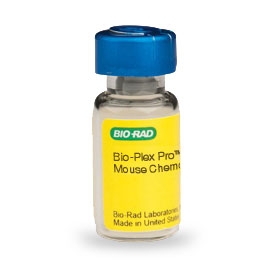
Description
Description
Use these Mouse Chemokine Standards when performing Bio-Plex Pro Mouse Chemokine Assays, either as singleplex or multiplex assays.
- Enough for one 96-well assay
- Use with Bio-Plex Pro Reagent Kit V (12002798)
The vial of lyophilized standard contains the following 34 recombinant mouse analytes:
-
- BCA-1 / CXCL13
- CTACK / CCL27
- ENA-78 / CXCL5
- Eotaxin / CCL11
- Eotaxin-2 / CCL24
- Fractalkine / CX3CL1
- GM-CSF
-
- I-309 / CCL1
- IFN-γ
- IL-1β
- IL-2
- IL-4
- IL-6
- IL-10
-
- IL-16
- IP-10 / CXCL10
- I-TAC / CXCL11
- KC / CXCL1
- MCP-1 / CCL2
- MCP-2 / CCL8*
- MCP-3 / CCL7
-
- MCP-5 / CCL12
- MDC / CCL22
- MIP-1α / CCL3
- MIP-1β / CCL4
- MIP-2 / CXCL2
- MIP-3α / CCL20
- MIP-3β / CCL19
-
- RANTES / CCL5
- SCYB16 / CXCL16
- SDF-1α / CXCL12
- TARC / CCL17
- TECK / CCL25
- TNF-α
*MCP-2 requires a different dilution factor and is therefore available only as a singleplex set
Benefits of the Mouse Chemokine Assays
- Gain confidence in your results with a high-performing assay
- Detect more target analytes with optimized chemistry and broad dynamic range
- Streamline your workflow with pre-mixed reagents and a simplified magbead-based protocol
- Obtain data for large number of biologically-relevant targets from a single experiment.
Instrument Compatibility
Compatible with these readers and wash stations:
- Bio-Plex MAGPIX or Luminex MAGPIX System
- Bio-Plex 200 or Luminex 200 System
- Bio-Plex 3D or Luminex FLEXMAP 3D System
- Bio-Plex Pro Wash Stations
More Information
To learn more about performance characteristics or how to set up your mouse chemokine assays for optimal performance and sensitivity, see our supporting documents:
Other Available Mouse Multiplex Assays
- Find the panels containing all the targets you are looking for using Bio-Plex Assay Finder
- Browse cytokines, chemokines, and growth factors from other assay panels
Related Products
Bio-Plex Pro Mouse Cytokine, Chemokine, and Growth Factor Assays
Magnetic bead-based assays detect and measure levels of 57 analytes in diverse matrices such as serum, plasma, and tissue culture supernatants. Cytokines, chemokines, and growth factors are cell signaling proteins that mediate a wide range of physiological responses, including immunity, inflammation, and hematopoiesis. They are associated with a spectrum of diseases ranging from tumor growth, to infections, to Parkinson's disease.
Bio-Plex Pro Mouse Th17 Assays
Magnetic bead-based immunoassays detect and measure the levels of 17 Th17 cell-associated biomarkers in diverse matrices such as serum, plasma, and tissue culture supernatants. IL-17 producing T helper Cells (Th17 cells) are a new subset of T helper cells recently found to be associated with autoimmune diseases such as rheumatoid arthritis, multiple sclerosis, psoriasis, and lupus. The markers in these assays were selected for their direct relevance to the mouse Th17 pathway.

